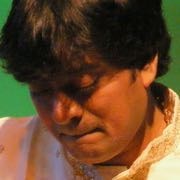Mysore Venkatesha Doraiswamy Iyengar (1920-1997) was a Carnatic musician and one of the greatest exponents of the veena in modern Indian history. Born into a family of classical performing artists, he was a son of Venkatesha Iyengar, a learned vainika and royal musician at the court of the Princely State of Mysore.
Doraiswamy started learning the veena from his father at an early age and soon became a disciple of Veena Venkatagiriyappa, one of the foremost vainikas of the day in Mysore. He performed in the presence of the then Maharaja of Mysore at the age of 12. Spellbound, the Maharaja presented him with a fifty-rupee silver coin and urged Venkatagiriyappa to nurture Doreswamy as he was bound to bring laurels to the Mysore State.
He gave his first public performance in 1943 at the Bangalore Gayana Samaja. He participated in music conferences including one in Shiraz, Iran, in 1969, where he was also invited to perform at the Shiraz Persepolis Festival of Arts. Over the course of his career, accolades poured in. He was awarded the Padma Bhushan by the President of India in 1983, the Sangeetha Kalanidhi of the Madras Music Academy (1984), the Sangeetha Kalasikhamani of the Indian Fine Arts Society (1994), the Sangeetha Kalaratna of the Bangalore Gayana Samaj, and the Chowdiah National Memorial Award.
Doraiswamy received a BA degree from Maharaja's College, Mysore. He served as the Music Director at the All India Radio in Bangalore. The University of Mysore conferred upon him an Honorary Doctorate in 1975.
In an age when most of the other vainikas had started using the contact microphone, Doraiswamy remained a purist and stuck to the ‘acoustic’ Veena. His style of playing is sometimes referred to as the Mysore Style. This distinctive style is marked by the movements from one note to another being achieved with the playing fingers (the index and middle fingers of the left hand) parted. This, along with his prolonged, medieval string plucking style enabled him to achieve the continuity of sound so essential to Carnatic music.
The veena is regarded as a solo, non-orchestral instrument and is accompanied only by percussion instruments. However, concerts of Doraiswamy Iyengar, accompanied by Mysore T Chowdiah on the violin, became very popular. He participated in many Jugalbandis, including with famous Hindustani classical instrumentalists such as Ustad Ali Akbar Khan. He composed music for dance dramas, especially those of P. T. Narasimhachar, a renowned Kannada poet. Doraiswamy also composed songs for a few Kannada films, notably Subbashastri, starring Kalyan Kumar. Doraiswamy was regularly accompanied on mridangam by Karnataka State Awardee V S Rajagopal. The noted vainika C. Krishnamurthy was one of Doraiswamy Iyengar's main disciples.
Doraiswamy died aged 77 in Bangalore, India. He is survived by his son D. Balakrishna, who was a career banker with the Reserve Bank of India but is among the foremost veena performers of the day and is the torchbearer of his father's unique Mysore style.



